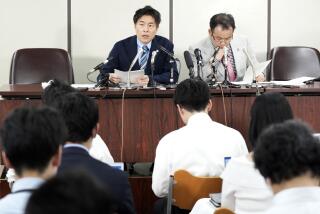Japan OKs Long-Delayed Law to Ease Organ Transplants
- Share via
TOKYO — In a move that has sparked hope for people awaiting organ transplants, Japan’s parliament Tuesday passed a bill authorizing transplants from patients whose brains have stopped functioning.
Japan has been one of the world’s few industrialized nations to prohibit most transplants, and doctors say thousands of people have died as a result.
“Without a law, transplants essentially couldn’t take place in Japan . . . so now that it’s passed, we’re happy,” said Yoshio Aranami of the transplant advocacy group TRIO Japan.
Lawmakers haggled for three years before passing the bill. Until now, doctors in Japan were required in all instances to define death as the moment the heart stops.
Cornea and kidney transplants are performed in Japan, mostly with organs from heart attack victims and living donors. But transplants of hearts and livers have been nearly impossible, because those organs must be taken from donors whose hearts are still beating; the organs deteriorate too rapidly once the heart stops.
Hiroshi Takamori, a 34-year-old calligraphy teacher in the central city of Nagoya who is awaiting a heart-lung transplant, learned of the law’s passage from television. “I’ve been struggling for so many years to get this bill passed, I feel so relieved now,” he told the Associated Press.
But some advocates worry that the bill’s restrictions mean it will have little real effect. The definition of death applies only to organ donors, and only when two or more doctors provide a written report asserting the donor is brain dead.
Would-be donors also must leave behind a written document recording their wish to donate their organs and authorizing doctors to declare them brain dead. And the donor’s family has the right to veto the decision.
The law does not apply to children younger than 6.
Other obstacles include a lack of the concept of “goodwill” donations in Japan, according to Hidetoshi Matsunami, a physician who specializes in live-organ transplants.
Matsunami said he sends most of his patients abroad for transplants and will continue to do so, since even with the new legislation, the need for a transplant is tantamount to a death sentence in Japan.
Public opinion on organ donation remains ambivalent, partly due to distrust of the medical establishment and to traditional beliefs including the idea that cutting a corpse defiles the dead person’s soul.
On Tuesday, the Asahi Shimbun, one of Japan’s largest newspapers, printed a cartoon showing surgeons huddled in an operating room, frozen with indecision. A body on the operating table, labeled “Organ Transplant No.1,” a scalpel stuck in its chest, ponders whether the doctors would approve the operation if the organs being donated were their own.
The new law imposes penalties for doctors who violate transplant requirements: a maximum of three years in prison or a $4,350 fine.
Thirty years ago, accusations of manslaughter against the doctor who performed Japan’s first and only heart transplant sent a chill through the medical community. The matter was dropped due to insufficient evidence.
In the United States, next of kin can authorize an organ donation, even without a donor’s written permission. In California and other states, would-be donors can make their intentions known as part of the driver-licensing process.
More to Read
Sign up for Essential California
The most important California stories and recommendations in your inbox every morning.
You may occasionally receive promotional content from the Los Angeles Times.










